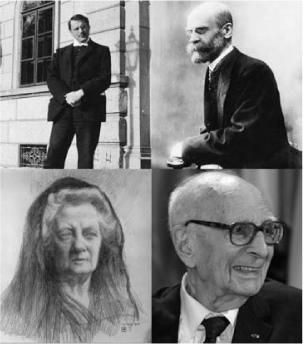Definitions and OriginsMythographers and Mythologists |
Who are the most influential mythographers? |
There have been many highly influential mythographers. A few have achieved what might be called “classical” status. With the development of anthropology and psychology in the late nineteenth and early twentieth centuries, mythology began to be taken seriously. Until that time, more often than not, myths were thought of as mere superstitions or misguided stories of dead religions. People studied Greek and Roman myths in school as literary museum objects that revealed aspects of obviously false ancient beliefs. An important early mythographer was Sir James Frazer (1854–1941), whose multi-volume The Golden Bough (1890) provided a serious and objective—non-theological—discussion of religion and myths much in the way Darwin approached discussing the natural world. For Frazer, myths were primitive science, attempts to explain nature. The French sociologist Émile Durkheim (1858–1917), in his 1912 The Elementary Forms of the Religious Life, compared ancient and modern forms of religion, treating myths seriously as allegorical forms that provided social unity and identity. In Cambridge, England, Jane Ellen Harrison (1850–1928), stood out among a group of scholars generally known as the Cambridge Ritualists, applying archeology and early anthropological techniques to Greek mythology and treating that mythology as the articulation of ritual acts. “Myth,” she wrote, “is the spoken correlative of the acted rite.” Her major work in this field was 1903, and then frequently revised, Prolegomena on the Study of Greek Religion. Among the proponents of the new fields of psychology and psychoanalysis early in the twentieth century, the leading mythographer was the Swiss analyst Carl Jung (1875–1961), Agreeing with Sigmund Freud (1856–1939) that myths could be compared to dreams, Jung went further, suggesting that myth reflected the collective psyche of particular cultures and that archetypal themes—common motifs that transcended cultures—pointed to a collective human psyche or Collective Unconscious. To study myth and common mythic themes such as the descent into the underworld, the flood, and the creation of the world was to study the human mind. Three mythographers of the modern age who generally agree with Jung’s universalist approach have been especially influential. These are the Romanian scholar Mircea Eliade, the French anthropologist Claude Lévi-Strauss, and the American mythologist Joseph Campbell.

Some influential mythographers have been (clock-wise from top left) Swiss analyst Carl Jung, French sociologist left): Émile Durkheim, French anthropologist Claude Lévi-Strauss (UNESCO/Michel Ravassard), and Cambridge Ritualist Jane Ellen Harrison.
